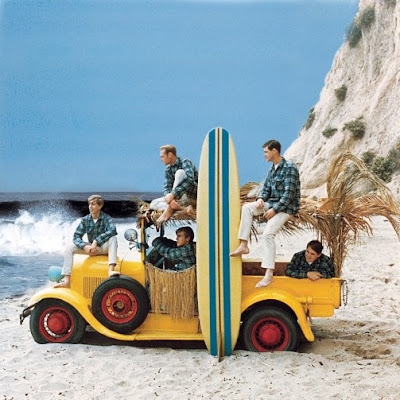Brian Wilson, the lumbering savant who wrote, produced and sang an outlandish number of immortal pop songs back in the 1960s with his band, the Beach Boys, is swiveling in a chair, belly out, arms dangling, next to his faux-grand piano at the cavernous Burbank, Calif. studio where he and the rest of the group’s surviving members are rehearsing for their much-ballyhooed 50th Anniversary reunion tour, which is set to start in three days. At 24, Wilson shelved what would have been his most avant-garde album, Smile, and retreated for decades into a dusky haze of drug abuse and mental illness; now, 45 years later, he has reemerged, stable but still somewhat screwy, to give the whole sun-and-surf thing a final go.
Before that can happen, though, the reconstituted Beach Boys must learn how to sing “That’s Why God Made the Radio,” the first new A-side that Wilson has written for the band since 1980. They are not entirely happy about this. Earlier, I heard keyboardist Bruce Johnston, who replaced Wilson on the road in 1965, talking to the group’s tour manager about an upcoming satellite-radio gig. “Just so you know,” the manager said, “Sirius wants you to perform ‘That’s Why God Made the Radio’ tomorrow night.”
“Oh really?” Johnston responded. “And how are we going to do that when we don’t know it?”
And so the band has gathered, once again, around Wilson’s piano. I’d like to imagine that this is how it was when they first accustomed their vocal cords to, say, “California Girls.” Except it’s not, exactly: back then, in 1965, Wilson was the maestro, conducting each singer as his falsetto floated skyward and his fingers pecked out the accompaniment. Now he stares at a teleprompter and sings when he’s told to sing, ceding his bench to one member of the 10-man backing band that will buffer the Beach Boys in concert and looking on while another orchestrates the harmonies and handles the loftier notes. At first, the blend is rough: Wilson strains to hit the high point of the hook; frontman Mike Love and guitarist Al Jardine miss their cues. But after eight or nine passes the stray voices begin to mesh. They begin to sound like the Beach Boys. Close your eyes, shutting out Wilson’s swoosh of silver hair and Love’s four golden rings, and 1965 isn’t such a stretch.
Or it isn't until someone's iPhone rings. Jardine's. He turns away from the piano and presses the device to his ear. "I'm going to have to call you back, because--wait, what?" He hangs up, shaking his head. "Dick Clark just passed away," he says. The room begins to murmur; the makeup lady covers her mouth with her hand.
Over the next few minutes, I watch as each Beach Boy absorbs the news. Love makes light of it, pretending to strangle Jardine behind his back. “You’re next, Al,” he purrs. Johnston, a former A&R man at Columbia, pitches Clark’s death as an angle for my story. “It’s kind of ironic to have our television hero in music pass away while we’re doing this next big move,” he explains
And then there’s Wilson—always the conduit, the live wire, the pulsing limbic system of the Beach Boys. As his biographer David Leaf once put it, “Brian Wilson's special magic in the early and mid-1960s was that he was at one with his audience ... Brian had a teenage heart, until it was broken.” At first, Wilson says nothing. Then I overhear him talking to Jardine.
“We're 70 fucking years old,” he says. “You'll be 70 in September. I'll be 70 in June. I'm worried about being 70.”
“It’s still a few months off,” Jardine says.
“That's true,” Wilson mutters. He pauses for a few seconds, looking away from his bandmate. “I want to know how did we get here?” he finally says. “How did we ever fucking get here? That's what I want to know.”
by Andrew Romano, The Daily Beast | Read more:
Photo: courtesy of Capitol Records Archive
